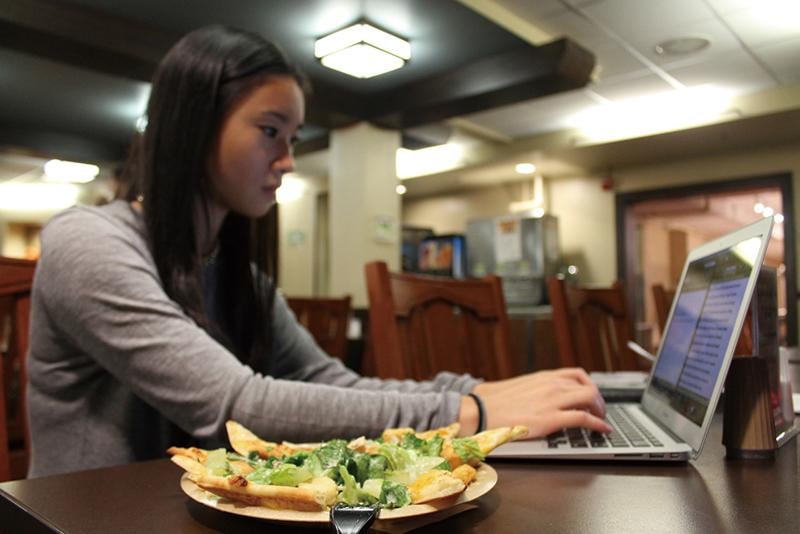Meal plan changes seek to increase student engagement, lower costs
Daily file photo by Annabel Edwards
A student eats and works at Fran’s Cafe. Northwestern has instituted several new dining policies for next year.
August 11, 2017
Freshmen will be required to purchase the unlimited meal plan as part of a series of dining changes related to Northwestern’s new two-year on-campus living requirement that administrators hope will increase student engagement with on-campus dining.
Director of dining Ken Field said he hopes changes in cost, as well as forgoing equivalency meals in favor of additional dining dollars, will make living on campus more enticing, particularly to students dismayed by the recently instituted two-year live-in provision.
By utilizing several student focus groups, the University was able to reduce costs — the unlimited, or open access, meal plan is now about $500 less expensive than in past years, Field said — and made other changes based on what students said they wanted.
Sodexo general manager Buzz Doyle said that Sodexo also used the information from the focus groups, student dining partners across campus and industry data about student dining habits to decide what would best serve the Northwestern community.
Doyle and district executive chef Chris Studtmann both highlighted the increase in plant-based nutrition coming this year, as dining tries to focus on providing healthy meals all day.
“We’re looking at it more as a complete offer from opening in the morning at breakfast all the way to the late night hours,” Studtmann said. “Diet is important. We’re moving to five meal parts throughout the day. We’re expanding our vegan line … to promote plant-based dining.”
Previously, equivalency meals with varying values based on the time of day were used to buy food at non-dining hall locations, but that option has been replaced with a more flexible system.
In the past, students had to use their weekly allotment of equivalency meals by Saturday evening, or they would not roll over into the next week. Field said that students in focus groups said they were often stressed by this hard deadline and ended up using their equivalency meals on things they didn’t want or need, just so they wouldn’t go to waste.
“One of the changes to the meal plan is we’re converting all the former points and equivalency meals to dining dollars,” Field said. “For the unlimited, or open access plan, (students) get 125 dining dollars per quarter, in addition to unlimited access to the dining hall.”
In addition, dining dollars will roll over until the end of the school year, Field said.
The block meal plan, which gives students a set number of meals at the start of the quarter, is now only offered to juniors and above. While the block plan includes fewer meals now, it does include more dining dollars, Field said, as well as a “considerably” reduced price.
In addition to revamping meal plans, Foster-Walker Complex’s late-night dining is getting a makeover, as well.
“We’re going to change the menus up for the late-night operations,” Field said. “(We’ll include) items you would see if you went to a restaurant in Evanston. It will be (an) upscale, made to order, order from a menu type of thing.”
Local restaurants such as Tomate Fresh Kitchen and Hecky’s Barbecue, which were featured in dining halls last year, will likely return on a monthly basis, Field said.
Field added that Elder Hall will offer breakfast, lunch and dinner and will be the only dining hall on campus to offer carry-out dining, where students will be given a container to take food with them.
Email: [email protected]
Twitter: @sophiemmann












